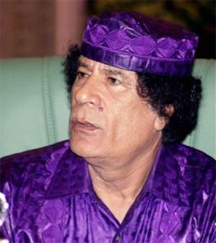LONDON, (Reuters) – Foreign powers mulling sanctions to restrain Libya’s bloody crackdown on unrest have little appetite for outright military intervention, while diplomatic differences may even block a basic U.N. rights council probe.
The U.N. Security Council criticised Libyan leader Muammar Gaddafi on Tuesday for using force against peaceful demonstrators and calling on those responsible to be held to account. On Wednesday the European Union agreed to take further measures against Libya including sanctions.
French President Nicolas Sarkozy called on European powers to suspend economic relations with Libya, while British Prime Minister David Cameron called for a new U.N. resolution.
Both countries had previously been major arms suppliers to Libya, rights experts say.
But with estimates as high as 1,000 dead and violence continuing, rights groups are unimpressed. They say Gaddafi’s recent speeches made it clear he intended to kill as many of his own people as necessary to stay in power.
U.N. RESPONSE CRITICISED

“All the Security Council have done is issue a press statement,” said James Lynch, Middle East and North Africa spokesman at Amnesty International.
“At the very least we need an arms embargo. If you look at Gaddafi’s speech yesterday, he was effectively talking openly about killing as many people as he needs to stay in power. That is an outrage and there needs to be some sanction against it.”
With communications patchy, exact details on events in Libya are hard to get. Rights groups say the Security Council should order the immediate sending of an investigative team on behalf of the U.N. High Commissioner for Human Rights.
But divisions within the 47-state U.N. Human Rights Council, where African and Asian nations are declining to support a draft resolution, could further stymie any investigation.
Human Rights Watch Middle East director Sarah Leah Whitson said world powers should also look at targeted financial sanctions against key members of Gaddafi’s elite and consider a referral to the International Criminal Court.
She said it was important that its rulers understand that “Chapter 7” U.N.-mandated military action was not impossible.
“It’s important that Gaddafi gets the message that that is in the ballpark,” she said.
Rights experts also want action to block any arrival of mercenaries from elsewhere in Africa. Head of the UN working group on mercenaries Jose Luis Gomez del Prado said his office had received multiple reports of their use in Libya and although it was not 100 percent confirmed, he believed it was likely.
But he said he doubted any of the possible countries of origin — Chad, Liberia, Democratic Republic of Congo among others — would take any action to stop it without a binding UN Security Council resolution declaring an embargo.
NO MILITARY DEPLOYMENT
Some experts have raised the prospect of a “no-fly zone” over Libya enforced by foreign fighter jets in the style of that used in Yugoslavia in the 1990s and against Saddam Hussein. That would at least stop Libyan aircraft targeting their own citizens. But it would not address most of the violence.
Western powers, in particular the United States and Italy, have enough aircraft in the region to be able to enforce any no-fly zone. But with memories of the Iraq war fresh, some worry any Western-led military action could make a bad situation worse. Virtually no one expects any deployment of peacekeepers or other ground troops beyond anything necessary to extract Western nationals.
“I’d be very surprised to see coordinated, proactive western security strategy in the near-term (on Libya),” said Ian Bremmer, president of political risk consultancy Eurasia Group.
The chance of the G20 coming together on Libya was minimal, Bremmer said. Earlier in the year, he coined the phrase “G-zero” to describe an increasingly rudderless world dominated by growing rivalry between powers particularly the U.S. and China.
“The Middle East implications of the G-zero are that other local actors become considerably more important,” he said, describing it as almost the opposite of the situation during the Cold War when major powers called the shots.
Neighbouring powers Egypt and Tunisia both have their own powerful armies and air forces, but both have seen their own revolutions and are still dealing with sporadic unrest.
OIL OUTLOOK UNCERTAIN
If Gaddafi were able to cling on in power, it is far from clear whether sanctions might include limits on oil exports — or even whether the industry would be under his control.
It is not impossible that production and exports could continue from the east, where tribes have rebelled. But it is far from clear who if anyone now controls those oil-rich areas.
A host of oil companies, including France’s Total <TOTF.PA>, Italy’s ENI <ENI.MI>, Spain’s Repsol <REP.MC>, Norway’s Statoil <STL.OL> and BP <BP.L>, have expanded in Libya in recent years as it appeared to be moving closer to the West.
One industry expert suggested offshore platforms might be able to continue production regardless, perhaps with payments made into a U.N.-mandated trust fund and held for the future.
Most energy firms are seen as aiming to play a long game, hunkering down, evacuating key staff and hoping some kind of order is restored ideally under a new government.
Some suspect the United States and others want to secure the evacuation of their nationals before taking a much tougher line.
“It was unquestionably necessary to assure the safety of Americans before taking the kind of very strong rhetorical position that I expect you are going to hear in the coming days,” said former U.S. ambassador to the United Arab Emirates David Mack.





